- Home
- Rachel Ford
Viper's Nest Page 2
Viper's Nest Read online
Page 2
He was in a stone arena, with row upon row of stadium seating. There were clear divides in the seating. At one end, there were private boxes – roomy and hosting divans and sofas. Adjacent to them were less spacious areas, with more persons and fewer fineries. But the majority of the space was reserved for mass seating, with rough clad bodies crammed together shoulder to shoulder.
It was very full, today. A powerful voice spoke, carrying above the crowd. “Fine sons and fair daughters of Stella, today marks the second of our ten days of The Remembrance.” Trygve’s eyes scanned the crowd for the source of that voice, and in a moment, he found it. It came from a little man, strangely enough, dressed in a pretentiously fine toga of purple fabric and gold threads. Chains of silver, denoting his station, ran across his chest, and a golden brooch pinned his tunic at the shoulders.
The Northman had the idea that, if someone had run a magnet past the speaker, his clothes would have followed, so heavily were they laden with precious metal, and he would have stood there quite naked. Trygve laughed at the idea.
“Today we will feast on breads and meats from the Imperial palace, compliments of our noble patrons, Emperor Faustus Augustus and Empress Cassia Augusta.”
Trygve had assumed the little man was emperor, if only because of the ostentatious display of wealth. But now a second man got to his feet, and beside him a lady. The man was tall and well built, with moderate features, dark hair and olive skin. The woman was the better looking of the couple by no small degree, though. Voluminous waves of brown hair were pinned loosely by her face and cascaded down her shoulders. Her features were smart and dainty, and, like her husband, her skin spoke of the long exposure to the sun. She was well tanned, and in her cheeks, there was a healthy flush of color. She was a tallish person with a good figure, but rather thin.
There seemed less gold between the pair of them, though a silver laurel sat on the brow of each, than the speaker. He was dressed in white with an overlay of midnight black, and she in white with highlights of ocean blues. They stood, waved at the crowd who returned their salutation with the deepest pleasure, and then resumed their seats.
The speaker preened as attention returned to him. “Such generosity. Such magnanimity. Has there ever been a pair to match our Emperor and Empress? Not in a thousand years!”
The crowd roared again, and again he allowed their enthusiasm. Then he picked up the thread of his original comments. “And as we eat, we will remember the sons of Stella who have bled and sacrificed so that the City, the Nation, may survive. Today we commemorate those who fell to the barbarian hordes from the North three hundred years ago.
“And it is thanks to Governor Caius of Blackstone that we have a fighter from the North today, a man who challenges our Stellan gladiators, who declares himself fit to take on the entirety of the South himself.”
A roar of disapprobation sounded from the crowd, and it took Trygve a moment to realize that the announcer was referring to him. He shouted a protest at this lie. Even in his drunken state, he would have remembered, he was sure, being drafted into anything this absurd. But he was drowned among the many voices.
The announcer held up his hands, and silence descended. “Well, my friends, we shall see if our Northern barbarian can live up to his own ego. Stellan warriors: do us proud. Let the fight commence!”
A frenzied roar answered this last call, and the announcer returned to his seat, looking quite satisfied with himself. Trygve cursed him to Hel, but with less vitriol than he reserved for Caius. Damned, deceitful politician. He’d promised him a job, a future; and what had he done instead?
Sent him to an arena, to wear the mantle of a Northern barbarian – on a day of remembrance for those who had fallen to Northern warriors.
A coliseum full of voices called for his blood. And three able warriors were advancing, only too eager to spill it. Frigg help me, he thought, so I can live to kill that man.
Hungover, outnumbered, and facing a crowd that was solidly against him, he was going to need divine intervention to make it through the next few minutes. Luck, certainly, was not on his side.
In his own land, the elders spoke of the Hamingja – the spirits that guided each man’s or woman’s luck. Caius had mentioned a Lady Fortuna. The Mirans had their own goddess of fortune. But whatever the name, the stories were always the same. Everyone knew of the vagaries of Fortune, how she raised men up only to lay them low again at a whim.
Of late, he’d been entirely on the downward trajectory. Every time Mistress Luck laid him as low as he thought he could go, she managed to knock the floor out from below him and cast him a level deeper into Hel’s hall. Here he was, in a level he had never imagined.
Not that, if he was entirely honest, it was all Luck’s doing, or all the whims of his Hamingja. There was something to be said for his choices, and his circumstance being the consequence of his own actions. Of late, Trygve had taken to drinking more than he should have to forget less than he wanted to. But in his sober moments, he could not escape that stark reality.
Hangover or not, he was still sober. And that reality, in this sober moment, filled him with consternation. He turned to the snow leopard, who had followed him out of the gates. “We’ll get through this, Gunnar. And when we do, I’m going to stick a blade through that governor.”
Empress Cassia Augusta surveyed the scene below her with a forced air of interest. These games, these spectacles of death, were not to her liking. Such a thing would never have been permitted under her father, Emperor Augustus II.
But there was a new emperor, now. And her husband Faustus was a fan of the games. He was not so impolitic as to reintroduce the slave gladiatorial combatants that her family had outlawed five generations ago. No. These were freemen who – through either bloodlust or desperation – pledged themselves to the tournament.
But Cassia could not view the spectacles with anything but abhorrence. Men torn to pieces, animals skewered, bones broken and lives lost – and for what? For laughs, for the morbid excitement of watching a man destroyed, one blow at a time.
Faustus had taken her father’s name as his patrionymic, in a sort of symbolic tie to the royal house. She should have been pleased, she supposed. But in moments like these, she could not but see how unlike Augustus her husband was.
He was grinning broadly, his green eyes glistening with interest as he watched. “He won’t last much longer,” he said.
She grimaced, turning away from Faustus. He was, she supposed, right. The Northman was a giant of a man, with a great mane of golden hair and a shaggy, equally light beard. Some manner of beast – a snow leopard, she thought – fought alongside him. But against three warriors, three trained gladiators?
The Northman’s boasts would soon prove his undoing. She could not but pity the man, as she pitied all of them.
She turned away, unwilling to watch what would be a slaughter. The clash of steal on the field below was almost drowned out by the crowd, who were as enthralled by the combat as her husband. If she turned aside long enough, she would not have to see him die. She’d miss that, at least.
It was one thing to see them dead. It was horrible, of course, but it was not as bad as watching them die. There was a moment – she’d seen it too many times – when the losing gladiator saw his end, when he realized that his best efforts were not enough; when he saw Death approaching, and knew he was powerless to stop it.
The fear, the anguish, the regret that wrote itself across men’s faces in that moment haunted her dreams some nights. It was the breaking down of the human spirit, the destruction of the soul and dignity of another person; and all for the crowd’s entertainment. For Faustus’ pleasure.
“Ohh!” her husband hissed to her side.
She fought the urge to turn, but a second exclamation – this time, bolstered by similar noises from the crowd – drew her attention. He’s dead, then, she thought.
One of the four men was dead – he lay, unmoving, in a pool of his own blood while the
other three danced their waltz of death over his corpse. But it was not the Northman who was dead. Rather, one of the gladiators had fallen.
It was a grim business, but she was impressed with the Northerner’s skill at least. Not many men could survive as long as he had against three others. She gasped as a blur of silver and black fur leaped from the ground. It was the leopard, and it pounced with a ferocity and quickness that – even from a distance – put her heart in her throat. The crowd seemed to have gasped with her, and now all were silent. In a moment, the snow leopard had encircled one of the gladiators with its massive paws, biting deep into the man’s head.
Cassia cried out in horror, averting her eyes for half an instant as blood spurted from the wounds. The gladiator was losing a series of plaintive wails, trying desperately to free himself. But the beast’s back paws had found purchase on his sword arm, and the weight was preventing the man’s movement. They tumbled backwards onto the ground.
The gladiator lost his sword; the snow leopard stayed fixed in place. The other fighter turned as if to come to his friend’s rescue, and all at once the Northman fell on him. He delivered a wicked blow of his pummel onto the other man’s skull, and the fighter collapsed into a heap. The Northman kicked away his blade, and then called to his beast.
The snow leopard, the silver of its fur streaked with blood and a savage gleam in its eyes, drew back on command.
The barbarian stood now, his sword raised to the downed man’s throat. He was in no fit state to fight. Great gashes ran down his face and arms, and he was bleeding profusely. One of his eyes seemed either to be destroyed or else the flesh near it torn in gruesome fashion.
Cassia thought she would throw up. She thought the Northman would murder his fallen opponent on the spot. But neither happened. She forced down the bile that rose in her throat, and he said, “Surrender.”
The reply was shaky, but audible. “I yield.”
Faustus hollered his disapprobation. “Cowards,” he taunted. “Three men, and you let a savage beat you?”
The crowd seemed to mirror his sentiment on cue. An angry mood swept the assemblage, and first one then another call of “Death!” sounded.
The emperor waited until the drone of voices was heavy, then nodded. “Death!” he called.
The crowd cheered, and Cassia turned away. She could not bear to see it. It was bad enough to watch these wretched souls battle to the death, but to kill a man who lay bleeding in the dirt? She would not watch that. She could not watch that.
But no crescendo of satisfaction sounded, no gleeful murmurs met her ears. The crowd continued to demand its blood.
Cassia hesitated, then – carefully – glanced back at the field. The Northman had left the fallen gladiator and was checking the dead man – for a pulse, it seemed to her.
Otho – the patrician whose booming voice and uncanny ability to work crowds up had earned him the position of officiator of imperial events – held up his hands. The multitude acquiesced, but their misgivings were palpable in the grumbles that persisted longer than they should have. “Victor,” he called, and there was a note of mockery in the rich timbre of his voice, “claim your victory. Dispatch the fallen, as your emperor commands.”
The Northman stood now and scrutinized him. Then, he laughed. It was a hearty sound, but without much mirth. “My emperor?” he repeated, in tones that carried easily to her box. “I am a free man of the North. I will not dishonor myself by killing an unarmed man, whoever commands it.”
Otho was nonplussed, and Cassia glanced at her husband. Something about the brash words impressed her, but she was careful to keep her expression neutral.
Faustus, however, laughed out loud. He, at least, seemed amused by the stranger’s insolence. He stood and walked to the edge of their box. Raising his hands and stretching them wide in a benevolent gesture, he declared, “Fair enough, Northman. You barbarians must keep to your own ways, I suppose. Well done.” Then, to Otho, he said, “Have them clear the arena, and send in the next opponents. Let’s see what our friend from the North can do.”
Chapter Three
Trygve collapsed into a heap of blood, sweat, and strained muscle on the straw that was laid out for him. Gunnar slumped down by his feet. They’d been four days in the arena now – four days of fights, four days of killing, four days of near death.
He had not been expected to survive the first, but his tenacity had turned the crowd in his favor. They cheered, now, when he emerged. The announcer – that damned, insufferable little man – worked them up to cheer him on against increasingly difficult odds.
The first day they had sent him against men. He’d fought eight matches – the first five of them in a row. The second day he’d been brought out only four times, against a mixed lot of men and beasts. Yesterday and today, he’d gone out three times each. He and Gunnar had been in a team of twelve today, matched against another such team; and then another; and another. In the end, only four other men survived of his original group.
He was far too exhausted to contemplate that, though. He was too tired even to remember his hatred for Caius. He knew that, soon enough, the call to rise would come. And if he was going to survive – and he was increasingly less certain of that – he would need rest.
He was asleep almost as soon as he hit the ground but was roused sometime later by the door to his cell opening. His jailer – called Rufus, he’d learned since arriving – was carrying a tray of food. “Northman,” he said, nudging him with his foot. “Get up. You need to eat.”
Trygve blinked his eyes open blearily. “It’s not time already?”
Rufus laughed. “No, it’s still night. But food has come.”
“Oh.” He’d forgotten about dinner. Not that there was much to recommend it to memory. The gladiatorial contestants were treated to a combination of meat by-product so vile that it outmatched the worst rations he’d ever consumed, in the leanest of winters. Still, it was enough, if only, to keep him alive.
“Tonight,” the other man was saying, “it’s worth eating. This has come from the palace.”
“The palace?” That was a surprise, and Trygve didn’t like surprises. “Why?”
“There’s a note,” he said. “Maybe it will explain. But you’ll have to read it.” With an apologetic shrug, he said, “I can’t make out letters.”
The Northman had rose to a sitting position now and accepted the tray. In their time together, he and Rufus had come to terms. If nothing else, the southerner seemed to have developed a kind of like borne of pity. More than once, he’d commented on the injustice of sending a man out again and again. “It’s not how the games are done. It’s murder. You need time to heal.”
But no time was granted. By some cruel twist of fate, survival had brought the crowd – and the emperor’s – notice. And notice demanded showings. It was a vicious cycle. Every win brought more favor – the same favor that demanded his appearance. Either the week or his life would be the only end to it.
Trygve surveyed the tray with suspicion. It was loaded in food. Not the suspicious brownish-gray globs he’d been accustomed to, but real, genuine food. His plate was covered in excellent colors and savory smells. Roasted fowl and a leg of some kind of small beast – a goat, he thought – shared space with a bowl of meaty fruit and loafs of bread. “What is this?” he wondered aloud. “A joke?”
“When the emperor favors a fighter,” Rufus said, “sometimes he will send food, or some other token.”
The Northman snorted. “Fatten a man up before the slaughter, eh?” Despite his misgivings, he reached for the note and read.
Your pace is slowing, Northman. Eat well. I’d hate to see you die before Consecration Day.
F
Trygve glared at the paper, imagining the satisfaction of its writer as he penned those words.
“What does it say?” his companion wondered.
He read it aloud, offering his own thoughts on the anatomically challenging feats he’d like to suggest
the emperor attempt with that letter. Rufus seemed in turns shocked and amused. “Such words are dangerous,” he told him in a moment.
“I’m about to die anyway,” Trygve declared. “It’s not likely to make a difference.”
“Still. Better to be careful. Eat, Northman. Tomorrow will come sooner than you know.”
It did. Days came and went; matches came and went. Trygve lost track of the fights, the hours, and then the days. He knew only the fatigue of overworked muscles, the ache of wounds that had no opportunity to heal, the throb of bruises that could only deepen and spread.
Gunnar seemed to spend every free moment either eating or sleeping. The work was taking a toll on the snow leopard at least equal to that on the man. But Trygve was too weary to worry about it. He saw, and then he slept himself.
It was Rufus who told him that he’d made it through the ninth day of the festival – his eighth in the arena. “Well, Northman, if you survive tomorrow, you’ve done what few gladiators can boast. You’ve lived through the Consecration.”
He heard that, and then slept. He was roused shortly after the coliseum opened at sunrise. The din of the crowd, hungry for the day’s promised festivities, was great. It cut through even his leaden exhaustion.
Rufus brought breakfast – another tray from the palace. Faustus’ interest in the Northman had not waned. He had sent at least a tray a day since, usually with a half mocking note.
Today was no different. The note read,
From what I hear, it’s going to be an interesting lineup today. Eat well – if you don’t make it out, at least you’ll make a good meal for my pretties.
F
When he heard this, Rufus scowled. “You will need your strength, Northman. You should eat. Today is Consecration Day.”
“What is Consecration Day?”
The other man frowned at his ignorance. “The final day of the remembrance festival. There are rituals at the temple, and –” He surveyed Trygve, as if not entirely sure how to phrase his next point. “Well, a lot of bloodletting in the coliseum. In the days of Augustus – before Emperor Faustus – there were animal sacrifices, and then the animals were roasted and the meat passed out to the people. Now there is bread provided, and the sacrifices are men.”

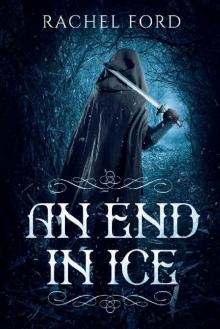 An End in Ice
An End in Ice Squire Derel
Squire Derel Eye for an Eye (An Owen Day Thriller)
Eye for an Eye (An Owen Day Thriller)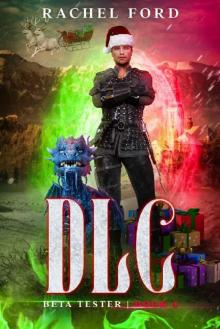 DLC: A LitRPG Adventure (Beta Tester Book 4)
DLC: A LitRPG Adventure (Beta Tester Book 4) Prison Break
Prison Break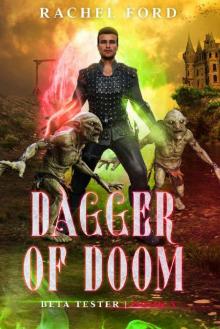 Dagger of Doom: A LitRPG Adventure (Beta Tester Book 5)
Dagger of Doom: A LitRPG Adventure (Beta Tester Book 5) Lee Shores
Lee Shores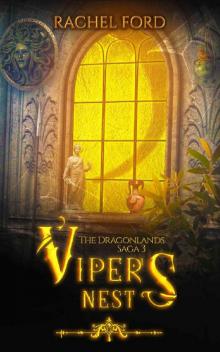 Viper's Nest
Viper's Nest Solar Flares & Tax Snares
Solar Flares & Tax Snares Without Sin (An Owen Day Thriller)
Without Sin (An Owen Day Thriller) UFOs & Unpaid Taxes
UFOs & Unpaid Taxes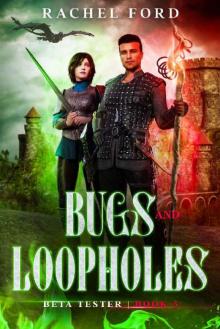 Bugs and Loopholes: A LitRPG Adventure (Beta Tester Book 3)
Bugs and Loopholes: A LitRPG Adventure (Beta Tester Book 3)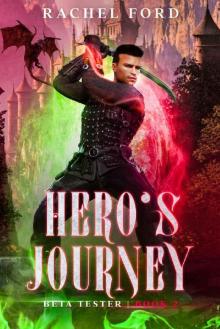 Hero's Journey: A LitRPG Adventure (Beta Tester Book 2)
Hero's Journey: A LitRPG Adventure (Beta Tester Book 2)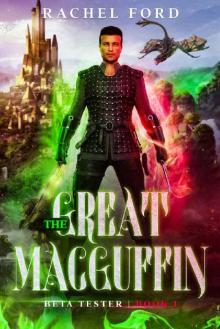 The Great MacGuffin: A LitRPG Adventure (Beta Tester Book 1)
The Great MacGuffin: A LitRPG Adventure (Beta Tester Book 1) MarvelousCon & Tax Cons
MarvelousCon & Tax Cons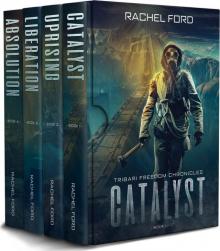 The Tribari Freedom Chronicles Boxset
The Tribari Freedom Chronicles Boxset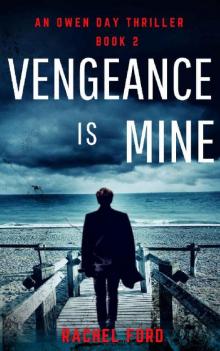 Vengeance Is Mine (An Owen Day Thriller)
Vengeance Is Mine (An Owen Day Thriller) T-Rexes & Tax Law
T-Rexes & Tax Law The Time Travelling Taxman Series Box Set
The Time Travelling Taxman Series Box Set Mob Bosses & Tax Losses
Mob Bosses & Tax Losses